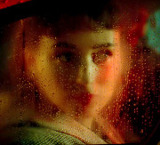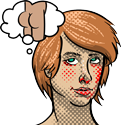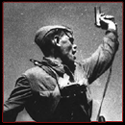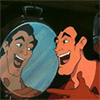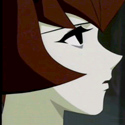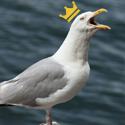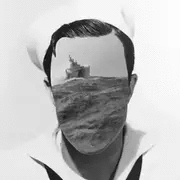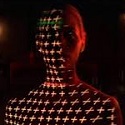|
I also read Tehanu pretty young, and found it jarring. Returning to it as an adult I think it's a really important story. I admit I'd probably prefer if Tenar had become a badass wizard and torn down the whole Earthsea gender system by main force, but LeGuin's take on it is probably more sophisticated and more important - it's not just a criticism of her own focus on men, but of fantasy's focus on the powerful, the 'doers', at the expense of the workers. In trying to talk about the value of 'women's work', I think LeGuin runs the risk of gender essentialism. But it's interesting to note that Tenar rejects the explicit essentialism she encounters. One of the witch characters declares that women have their own power, separate from wizards, a deep dark ancient power - but Tenar (rather cuttingly) replies that she's had quite enough of deep dark ancient powers in Atuan. I do think it's a shame we never got to see a really powerful woman wizard. Dragonfly almost qualifies, but, of course, in the end she's a dragon. (I never actually noticed the pun in her name  ) )
|
|
|
|

|
| # ? Apr 27, 2024 03:21 |
|
I just got the Earthsea Trilogy and am excited to read it now because I have forgotten the awful Sy Fi made for tv version. That was just abysmal. A mini series that bad had to be made lovely on purpose. It also turned many people away from reading the books.
|
|
|
|
Have these stories ever had a decent adaptation? Not even Studio Ghibli did them justice 
|
|
|
|
Aphra Bane posted:Have these stories ever had a decent adaptation? Not even Studio Ghibli did them justice I got the impression the only reason she let Studio Ghibli have a crack at it is because of how well Miyazaki adapted Howl's Moving Castle. Instead, they shuffled the Earthsea project to one of the studio's lesser teams (Miyazaki's son or something?) who turned it into a violent piece of poo poo filled with standard Anime cliches.  In the end, all Leguin had to say about it is something like, "Yep, that sure is a movie all right. It's weird to see people using your character's names for their own characters." Stuporstar fucked around with this message at 08:19 on Nov 9, 2013 |
|
|
|
Tales from Earthsea isn't great, but it's not quite as bad as people say and has a bit more to offer if you think of it as a Ghibli film more than an Earthsea one. Plus, the clichés aren't anime clichés...General Battuta posted:I also read Tehanu pretty young, and found it jarring. Returning to it as an adult I think it's a really important story. I admit I'd probably prefer if Tenar had become a badass wizard and torn down the whole Earthsea gender system by main force, but LeGuin's take on it is probably more sophisticated and more important - it's not just a criticism of her own focus on men, but of fantasy's focus on the powerful, the 'doers', at the expense of the workers. That wouldn't have gone at all well with the books' commitments to anti-authoritarianism - either from the Daoist perspective, or a textual one. People who try to just wipe out all evil tend to become evil themselves; it's mentioned in The Farthest Shore, I think, as Cob's motivation and there are wizards who tried similar things beforehand and had to be stopped. It's also an expression of sympathy with non-heroes and non-adventurers, unlike the first trilogy.
|
|
|
Aphra Bane posted:Have these stories ever had a decent adaptation? Not even Studio Ghibli did them justice They're sort of a perfect storm of "difficult to film". The stories are introspective and allusive, the protagonists are non-white and sometimes non-male, so forth.
|
|
|
|
|
Hieronymous Alloy posted:They're sort of a perfect storm of "difficult to film". The stories are introspective and allusive, the protagonists are non-white and sometimes non-male, so forth. I've always had this fantasy since I was a kid (since before the Lord of the Rings movies even existed) that I would become a master filmmaker when I grew up and my magnum opus would be adapting the Earthsea books into a trilogy of films that had the same spare, lyrical beauty of the books. Of course it's utterly silly now, and those films would never get made. But it's nice to fantasize about. Earthsea films would have to be more in the vein of like... a Jim Jarmusch-esque indie where characters speak in stylized riddles and scenes can go for 15 minutes with no dialogue and almost nothing happening. Like, that's how the climax of A Wizard of Earthsea would have to be filmed - maybe 20 minutes of no dialogue with Ged and Vetch sailing into oblivion and speaking nothing for days at a time. God, what a wonderful film that could be if made properly. Oh, and the relationship between Studio Ghibli/Miyazaki and Earthsea/Le Guin goes deeper than that. Miyazaki has said that the Earthsea books are his absolute favorite novels of all time, as I recall, or some extremely esteemed praise like that. Back in the early '80s when he was starting out he really wanted to adapt them and asked Le Guin directly at least once or twice. She refused him at the time because she was still very wary of such things back then and didn't want to just give the Earthsea rights away to a guy who wanted to make it into a Japanese cartoon that (at the time) probably would not have gotten any wide exposure in America. And to be fair this was Miyazaki before he had made any of his great films, and was known mostly for his work on Lupin III and Detective Boy Conan. So it wasn't like Le Guin was saying no to the guy who had made Princess Mononoke and Spirited Away. It's really, like, one of the truly great tragedies that she didn't say yes to him, nevertheless. And Le Guin, of course, wrote that she now deeply regrets that she didn't say yes back then. Miyazaki ended up making Nausicaä of the Valley of the Wind instead, and interestingly you can see definite influences from Earthsea in it, as well as in lots of his work. I watched Princess Mononoke again recently and was struck by just how much it reminded me of the Earthsea books, especially the first one - being about a heroic young man bearing a sort of shadow-curse that is emblematic of the hatred that exists in the hearts of men. In any case, It sucks so badly that Miyazaki's son hosed the project up so much. I still haven't seen all of Tales of Earthsea - I got 10 minutes and shut it off because it was too goddamn painful. It really is just a different story that borrows the names. It's not even set on a freaking archipelago! It shouldn't even be named Earthsea in that case! And I love that the film is a bastardization of The Farthest Shore and Tehanu, yet is called 'Tales From Earthsea' which is the name of a short story collection from which the film adapts nothing. And it's a freaking wonderful collection of stories that every Earthsea fan should read.
|
|
|
|
The Left Hand of Darkness is probably my favorite sci-fi novel. I would kill for a well done mini-series. I loved the reflection that the main character has about his time and his misunderstandings and judgements of their culture. Estraven is the coolest.
|
|
|
kaworu posted:I've always had this fantasy since I was a kid (since before the Lord of the Rings movies even existed) that I would become a master filmmaker when I grew up and my magnum opus would be adapting the Earthsea books into a trilogy of films that had the same spare, lyrical beauty of the books. Of course it's utterly silly now, and those films would never get made. But it's nice to fantasize about. Earthsea films would have to be more in the vein of like... a Jim Jarmusch-esque indie where characters speak in stylized riddles and scenes can go for 15 minutes with no dialogue and almost nothing happening. The funny thing is I can completely see that working as a movie but it would take a one-in-a-thousand director. And it would win awards at Cannes but fail utterly at the box office. I actually tried to do a student film of The Ones Who Walk Away from Omelas at one point. It predictably failed horribly and I took the wise path of scrapping the project and turning in a paper instead.
|
|
|
|
|
kaworu posted:In any case, It sucks so badly that Miyazaki's son hosed the project up so much. Tales from Earthsea has a lot of problems but Goro Miyazaki's not to blame for all of them, or even most, I think. He was only the director and co-writer; the other writer's stuff hasn't been very good either, like a lot of recent Ghibli films. Anyway, some thoughts on re-reading A Wizard of Earthsea for the first time in a few years: Ged dies (mostly metaphorically) a lot. I counted five times – after casting the mist-magic, after summoning the shadow, trying to save the dying son, on Osskil moor (this one's a clumsy “he fainted, but bystanders saved him” move), and when he flees in falcon form. Even for a story like this, it's excessive. Since I criticised a particular episode, I'll balance it by noting that the interlude on the island with the Kargish castaways is very good as a description of “force turned ruinously back upon itself”, a castration scene, a reflection of the first chapter (Ged is the invader, he does magic to help them, they give him a gift) and pathetic in its own right. The wizards are somewhere between druids, friars (or Buddhist monks), and monks. They perform baptisms, but not marriages or funerals. When I first read it I thought the Kargs were Japanese, for some reason (perhaps because their islands look like Japan?), but they're clearly Vikings. They even come in longships. Osskilians are white too, but despite the other people being mostly “copper-brown” or “black-brown” in the East, the furniture of their world's mostly European: clinker-built dinghies, ale in taverns, fish nets, rushwash tea, yew and alder trees, and so on. The only specifically non-European aspect was the use of ivory coins. And most of the names are English pseudowords – Sneg, Jessage, Simly, Perregal. It seemed to me that the language was generally British English, but perhaps le Guin was avoiding modern forms. The exceptions are the Kargs and the Old Speech. Who gets named what is important: the narrator only refers to the main character as Ged after he's named, but no others except Vetch in the note at the end. There's probably a good semiotic reading of the book that I'm too ignorant to perform. It's interesting than for humans the Old Speech is impossible to lie in, and binds a person, implying that the signifier-signified connection is non-arbitrary (which is why it's magic) – but not so for dragons: they can lie in the Old Speech, though a vow by their names is binding. They don't seem able to do magic, why not? The dead, being part of the world, are know by their true names. The Master Namer's name means “nothing in any language”, so where do the characters' true names come from? Are they existing Old Speech words or inspired invention by the wizards? If it's the latter, wizards have a terrifying existential monopoly on Earthsea, also like priests. Women get a terrible showing in the book. Some have children and then die; others are one-line characters; others are weak and wicked (Ged's aunt) or strong and wicked (Serret). The only major, good female character is Yarrow, whose main role is weaving and cooking for Ged and Vetch – and whose true name Vetch tells Ged. On their own the last three are good characters, but I see why K. le Guin was dissatisfied. It's a brief book but very dense. Most chapters could be short stories. It's also very well-written; I noticed two phrases where I thought K. le Guin dropped the ball in the whole book. The bleak seriousness is offset nicely by occasional humour and enchantment, and the symbolic aspects are balanced by realistic detail – Ogion's windows are holes in the wall, covered by shutters. As it has such a traditional plot, setting, gender roles, and symbolism, the style is probably its greatest achievement.
|
|
|
|
I'm pretty sure dragons straight up can't lie. I thought it was at least in part because they basically bend reality to match their words when they do speak since that's what magic is supposed to anyways. Then again I read Earthsea when I was 12 or so and can't really recall it all that well at all.
|
|
|
|
House Louse posted:Tales from Earthsea has a lot of problems but Goro Miyazaki's not to blame for all of them, or even most, I think. He was only the director and co-writer; the other writer's stuff hasn't been very good either, like a lot of recent Ghibli films. You are probably entirely correct on this front, and the failure of a film like that (and I should note that it was not a complete failure as a film by all accounts), just a severe disappointment to those of who were both Earthsea and Ghibli fans and were hoping for something like an adaption worthy of the name Miyazaki - which it unfortunately was not. House Louse posted:There's probably a good semiotic reading of the book that I'm too ignorant to perform. It's interesting than for humans the Old Speech is impossible to lie in, and binds a person, implying that the signifier-signified connection is non-arbitrary (which is why it's magic) – but not so for dragons: they can lie in the Old Speech, though a vow by their names is binding. They don't seem able to do magic, why not? The dead, being part of the world, are know by their true names. The Master Namer's name means “nothing in any language”, so where do the characters' true names come from? Are they existing Old Speech words or inspired invention by the wizards? If it's the latter, wizards have a terrifying existential monopoly on Earthsea, also like priests. These are all very good points to bring up. Good enough that the exploration of some of these issues in fact forms the substance of the later books, as I am sure you are aware - though I don't know if you've read the second Earthsea trilogy (Tehanu, Tales From Earthsea, The Other Wind) or not. I did want to address a couple things briefly though. Dragons cannot do magic, and the answer to this is wrapped up in the fact that The Old Speech is their native tongue. Bear in mind that ALL wizardry is, in essence, based on men speaking the old speech, and working spells around it - and this is based on the concept that one cannot lie in the old speech; that in essence anything a man of power says in the old speech is made true. Thus, a wizard works a spell of changing his form, and the essence of that spell is stating "I am a falcon" and thus it is made so. At least, this was my basic understanding of how magic and speech are connected in the books. But with the dragons, I believe it is said that they not only speak the old speech natively, in a certain literal sense they are the old speech. Or as some character (probably Ged) puts it in some book, "As a fish is swimming, or as a tern is flight, so a dragon is The Old Speech." (thats based on memory so I have no clue how correct I got that quote). So it seems to me that the question of whether a dragon performs magic or not is almost immaterial; Le Guin's dragons very literally are magic in their absolute essence. Again, at least, this was my understanding. I really need to re-read The Other Wind and get on with these books (I'm currently on The Farthest Shore in my re-read) because I am almost positive Le Guin goes into a lot of this stuff in the final book. I did want to say, almost coming to the end of The Farthest Shore in my re-read, I am reminded again why this book was my absolute favorite, and why it moved me so much. I would argue strongly that the relationship between Ged and Arren is the strongest and most well-developed one in the series, and perhaps the central relationship of the series in many ways. It plays almost like a tragically doomed love affair, which it is in many ways, even if the love is platonic and spiritual, it is no less powerful or moving. I'm moving into the latter part of the book and there was a dialogue sequence between Ged and Arren that just moved me to blinding tears. It's intense stuff for me, perhaps because these books are so deeply ingrained in my consciousness, having read them several times when I was so young. kaworu fucked around with this message at 17:57 on Nov 14, 2013 |
|
|
|
Oh, I just remembered something: If you like Earthsea, I'd recommend giving Peter S. Beagle's Innkeeper's Song a try, along with his short story collection (in the same setting) Giant Bones. It's the closest fantasy to Le Guin's stuff I've ever come across.
|
|
|
|
This thread is inspiring me to read various LeGuin things I hadn't read yet and they're making me sad! For one thing. The Word for World is Forest. I got about 25% into this. This book is going to make me want to cut myself, isn't it? So Depressing. I mean, I get it, it's like the exact inverse of Avatar because James Cameron is a douchebag who believes in the magical transformative power of the white man's penis and LeGuin is the opposite of all those things, but still, so depressing =( Also finally getting around to reading her translation of the Tao te Ching. It has her commentary on each little section. My favorite so far (her comment below the dashed line): quote:If my mind's modest,
|
|
|
|
|
Algid posted:I'm pretty sure dragons straight up can't lie. I thought it was at least in part because they basically bend reality to match their words when they do speak since that's what magic is supposed to anyways. Then again I read Earthsea when I was 12 or so and can't really recall it all that well at all. The narrator sez they can't, but what he describes is more like differences of opinion and rhetorical misdirection than lying, so I dunno. Also, dragons, like the Old Powers, are weakened by water. kaworu posted:These are all very good points to bring up. Good enough that the exploration of some of these issues in fact forms the substance of the later books, as I am sure you are aware - though I don't know if you've read the second Earthsea trilogy (Tehanu, Tales From Earthsea, The Other Wind) or not. I've read the first four books. I know some of this will be explored later, but I'm looking at them in the present tense, so to speak. There are things in later books that I know I want to discuss. kaworu posted:Dragons cannot do magic, and the answer to this is wrapped up in the fact that The Old Speech is their native tongue. Bear in mind that ALL wizardry is, in essence, based on men speaking the old speech, and working spells around it - and this is based on the concept that one cannot lie in the old speech; that in essence anything a man of power says in the old speech is made true. Thus, a wizard works a spell of changing his form, and the essence of that spell is stating "I am a falcon" and thus it is made so. At least, this was my basic understanding of how magic and speech are connected in the books. To run with your first line a moment - yes, if doing magic is the result of a special relationship with the Old Speech, it's because of humans' subordination to it. Dragons aren't bound in this way, so they don't have the power of using magic. Though the idea that they are magic is something implied that I was reaching towards, and that you named. If you're interested in the magic, have a look at "Urdumheim" by Michael Swanwick, which is partly a critique of this kind of magic. kaworu posted:I would argue strongly that the relationship between Ged and Arren is the strongest and most well-developed one in the series, and perhaps the central relationship of the series in many ways. It plays almost like a tragically doomed love affair, which it is in many ways, even if the love is platonic and spiritual, it is no less powerful or moving. Absolutely.
|
|
|
|
I'll definitely take a look at that book Michael Swanwick, thanks  I'm really looking forward to re-reading the latter trilogy because I'm like 99% sure based on my recollection of The Other Wind that it largely concerns matters we're discussing, as well as lots about The Dry Land which is, to this day, the most utterly horrifying and vivid depiction of an afterlife I've ever encountered in description of depiction. I'm really looking forward to re-reading the latter trilogy because I'm like 99% sure based on my recollection of The Other Wind that it largely concerns matters we're discussing, as well as lots about The Dry Land which is, to this day, the most utterly horrifying and vivid depiction of an afterlife I've ever encountered in description of depiction.I also finished The Farthest Shore last night and predictably, it makes me want to just re-read the original trilogy instead of plunging into Tehanu, the prospect of which frightens me, because it's the only Earthsea book I never really closely read at least twice in its entirety. I only gave it a single read over 10 years ago and barely remember much about it at all, except that at the time I found it bewildering, unpleasant, and upsetting enough that I couldn't even consider the "quality" of the book. I think I'll have an easier time of it now, because I am not going into it expecting a traditional Earthsea book or anything that could even be described as a true "sequel" to the original trilogy. The Other Wind was the fulfillment of the promise of a true "sequel" to the first trilogy, I think. There is a question I have for people who have read the original trilogy though, and especially The Farthest Shore, that is really bugging me and has bugged since I first read the book years and years ago. WARNING: Spoilers follow for the end of The Farthest Shore, so do not continue reading unless you have finished that book! Okay. My question involves why we never learn Cob's true name, and what point Ursula was trying to make with this. The stage is set for this when we learn Cob's story early on (before Arren at least deduces that this is the man they seek). Ged tells Arren the story of how, in his more prideful days of youth, he taught this particular mage (who was using the Pelnish lore to truly summon spirits of the dead as practically a parlor trick) a lesson by dragging him across The Wall of Stones (the barrier between life and death) and back again, despite his cowardice and horror. Arren asks the name of this mage, and Ged says he can remember his true name, but not his use-name. Then there is an odd moment in the book where Le Guin describes the silence, and Ged continuing (in a "changed" voice) that they called him "Cob" back then in Havnor. Thenceforth in the novel, he is only ever referred to as Cob, and we never learn his true name. When Ged and Arren are on Selidor, and Ged works a spell of summoning to bring Cob to them, he says only "My enemy" in the invocation, in place of where Cob's true name would normally be. When Ged, Arren, and Cob are all in The Dry Land in the book's climax, Ged freely gives his name to Cob, while Cob hesitates when asked his true name and says that it is "Cob". The implication is that he cannot remember his true name. So this sort of makes sense, at least, it makes sense to me that Cob might forget his own true name through the process of rebirth, and thus lose his true essence of self... But what confuses me is whether Ged has forgotten it or not, or if he is lying to Arren when asked that question. Or what the significance is of the fact that *we* never learn Cob's true name throughout the course of the novel. That's what really strikes me as odd. I know it's written from Arren's perspective, and not Ged's, so that might be why we don't know it, but still. It was something that always seemed curious to me, and I am not sure if my own explanation is correct or not.
|
|
|
kaworu posted:
I read this as Cobb not even *having* a true name any more. He somehow managed to . . void himself. If Cobb had had a true name, Ged would know it; that's what Ged does. Ged realizes that name is "gone" when he tries to remember it, and just remembers "Cobb" instead. Since in Earthsea you *are* your name, this implies Cobb isn't even real any more; he's not a person, not a thing, just a void where his self was, and he's sucking the rest of the world into that void, like a hole in a pool. Hieronymous Alloy fucked around with this message at 19:22 on Nov 15, 2013 |
|
|
|
|
Hieronymous Alloy posted:I read this as Cobb not even *having* a true name any more. He somehow managed to . . void himself. If Cobb had had a true name, Ged would know it; that's what Ged does. Ged realizes that name is "gone" when he tries to remember it, and just remembers "Cobb" instead. Mmm. It's a good answer. Thank you, really, for explaining that, because it makes perfect sense. That's the moment when Ged realizes the truth on some level, when he remembers the man but cannot remember the name. Because that's the sickness that is spreading by the unlife of Cob - the forgetting of The Old Speech, of magery, of the true essence of things. So it really makes perfect sense that Cob and only Cob wold be an utterly nameless void still alive, sucking life from the great pool of The Archipelago at the edges/Reaches first and then effecting the core. Anyway. I'm several chapters into Tehanu and enjoying it *far* more than I thought I would. This is truly an adult book, because it simply deals with themes, conflicts, and issues that are truly pertinent only to adults, and those who have been in the world awhile. It's no wonder I was frightened and bewildered when I read this book at age 15; I had no frame of reference for how the above description of a lifeless, joyless world could be interpreted from a less mythic, more rural fantasy setting, and from the POV of an aging widow. And of course, it is all tied up in the existence of Tehanu/Therru - the walking metaphor for a the very feminine essence of the earth that has been used, abused, raped, beaten, burned, and left very nearly for dead by men/masculinity/wizardry - only to be nursed slowly and painstakingly back to life by blind hope and compassion. At least, I sort of read it that way, and I hope that doesn't sound too harsh or insensitive but, well, it's a very difficult and intense book, at least 100 pages in. I'm a little awed though, because it is much better than I thought it'd be. kaworu fucked around with this message at 22:17 on Nov 16, 2013 |
|
|
|
I think Hieronymus Alloy has it, and there's some evidence in The Tombs of Atuan and Tehanu for it.kaworu posted:I'll definitely take a look at that book Michael Swanwick, thanks It's a short story in his book The Dog Said Bow-Wow.
|
|
|
|
The books definitely benefit from a reading in semiotics. They play with the relationship between signifier and signified in various ways. The signifier can change the essence of the signified (as opposed to visa versa, the standard way we interact with the world). The signified can have no signifier, and, in an especially pernicious turn, the signifier can lose its signified. When that happens, there is nothing real behind the word (hence Cobb having no signified, just the signifier).
|
|
|
|
kaworu posted:Anyway. I'm several chapters into Tehanu and enjoying it *far* more than I thought I would. This is truly an adult book, because it simply deals with themes, conflicts, and issues that are truly pertinent only to adults, and those who have been in the world awhile. It's no wonder I was frightened and bewildered when I read this book at age 15; I had no frame of reference for how the above description of a lifeless, joyless world could be interpreted from a less mythic, more rural fantasy setting, and from the POV of an aging widow. Am I the only person here who loved Tehanu on the first read? Perhaps it is in fact a maturity thing. I read it within the first few years of it coming out, with the perspective of a mother whose children were on the threshold of their teenage years. I like your observation of the feminine essence metaphor, because that is the thing that leapt out at me from the very first read. The entire book was about balance. Mages remained virgin and celibate throughout their lives as the price of wielding power, and that isolation pushed them out of balance--they were supposedly wise, and yet an entire arena of human experience was closed to them, meaning they couldn't be as wise as they thought they were. And it explores also the result of that imbalance, including the dismissal of women as a gender.
|
|
|
|
General Battuta posted:We could do that, but I want to ask what people think of Tehanu, which, as noted above, has always been controversial. I read Tehanu immediately after finishing the first three books of the Earthsea cycle when I was like 14 years old. That was a mistake because I didn't understand it at all and I was horribly disappointed at the drastic shift in tone from the first three. The other books had been about dudes being awesome and this one was just terrible and bleak and nothing happened (it should be noted that I recall greatly enjoying the work of David Eddings roughly around the same time period). I left the Earthsea and le Guin alone after that until I read The Left Hand of Darkness like ten years later and well, it's one of my favorite novels. I still haven't re-read Tehanu though, nor have I read the final two Earthsea books. I really should go fix that. Thanks for reminding me! TheFluff fucked around with this message at 04:36 on Nov 19, 2013 |
|
|
|
I'm waiting to read Tehanu until I'm in the right mood for it. Frankly I'm worried it will be "good but depressing" and I generally avoid that kind of thing ever since a too-early exposure to A Farewell to Arms in my teen years. Some books just shouldn't be read until you're old.
|
|
|
|
|
While Tehanu is a troubling book, both in terms of its content and in its impact on the reader - it's a startling reversal of tone from the past three books - it also leads up to The Other Wind, which is an overwhelmingly pleasant, hopeful, serene book full of decent people. It's a really impressive conclusion to the Earthsea cycle because it seems to resolve all the tension in the world, all the ugliness Tehanu called out. It leaves you with a sense of mending.
|
|
|
|
Yeah, I just finished Tehanu and honestly... I don't think I had ever read all the way through. Either that or I had consciously just chosen not to remember all the truly unpleasant parts. Because boy, the climax of that novel (I'm thinking specifically of the scenes with Aspen) are just downright painful to read, especially when you're so invested in Ged and Tenar. Troubling, indeed. The truth of it is that, with the exception of just three male characters in the novel (whom I won't bother naming because they are more or less the three main male characters from the first three books) all the men in Tehanu are just absolutely monstrous and downright terrifying, albeit to varying degrees. But all of them are chauvinistic in the extreme, and the worst of them don't seem to consider women to even be people. It makes me feel utmost loathing for my own gender. It makes me understand The Other Wind a good deal more too, and I literally cannot *wait* to re-read it, because, like the above poster said, it really is a very serene, beautiful novel with none of the brutality and departure in tone that Tehanu represented. "A sense of mending" is the perfect way to put, and it is no coincidence that the most important new character introduced in The Other Wind just happens to be a "mender" by trade. Le Guin is nothing if not beautifully concise in her literalness, at times. I want to re-read Tales From Earthsea from beginning to end, first, though because as much as I desperately want to jump and just read all of The Other Wind right now, I promised myself I would do a full sequential read-through of all the Earthsea material. Now that I've made it through every word of Tehanu (again, not that it's bad, it was just difficult and gave me honestly more to think about than I wanted or was prepared for, in some ways) I'm thinking it'll be a real pleasure to read these last two, no matter what. edit: Oh! I have noticed recently since having to purchase new paperback copies of the original trilogy at various used book stores, many newer paperback editions of all the first four books lack the maps that were included in earlier editions. Those of us who read those early editions know just how incredibly helpful and important it was to have those maps, even if you had to squint to make out the big one in the beginning and Havor was split in half by the page break. It still helped! Well, later editions really weirdly don't seem to have any maps. I bought a copy of Wizard with no maps at all - and my old first edition handed from my dad which is falling apart and I would never read or fear of damaging even had close-up maps scattered throughout the book of the inmost sea or the east reach or where-ever Ged happened to be at that point in the story. None of that in newer books. My old copy of Tombs of Atuan has incredibly helpful hand-drawn maps of both the underground Labyrinth, and the Place around The Tombs - the newer editions I found do not. I can't imagine reading these books without those maps. And once again, I know early editions of Tehanu had a close-up map of Gont showing all its villages and rises and valleys and inlets and whatnot. The new edition of Tehanu I've been reading didn't have it. Such a huge less and needlessly confusing to new readers. So I wanted to link a couple links things for people: High-resolution hand-drawn map of Earthsea by Ursula herself This a fantastic map and the one that was included in newer hardcover editions of The Other Wind. She very courteously provides four different resolutions, including an awesomely huge one that is freaking 3736x2823 in resolution, and currently my desktop wallpaper  Here is a smaller one for the hell of it: Here is a smaller one for the hell of it: The Isolate Tower - Maps This is just a little fansite but when I tried looking for the unique maps from Tombs and Tehanu, this was really the only place I could find decent resolution versions of it! It has been very helpful during my mapless re-reads of those books, and I have gone back to the site to refer to it and figure out where things were going on at various times. It was invaluable. I hope some that of that is helpful! kaworu fucked around with this message at 16:39 on Nov 19, 2013 |
|
|
|
Zola posted:Am I the only person here who loved Tehanu on the first read? So K. le Guin wasn't just expanding the casts and themes of the series, but also the audience, and in the same sort of direction.
|
|
|
|
I am so excited to start reading Earthsea again, which I haven't since I was a kid. Her sci-fi novels are what I've read more recently and they are excellent. About their "heavy-handedness" or lack of it, I think she strikes a perfect balance between social commentary and fiction for its own sake. It seems like both The Left Hand of Darkness and The Dispossessed were conceived primarily to investigate social themes (gender and anarchism, respectively). She set out to create a world that would reflect and critique our own. But what elevates them above mere allegory is how she expands and fills out those worlds into something vivid and real (as opposed to, say, Swift or Voltaire whose fantastical satires are always obviously unreal.) The characters illustrate social points but they aren't just ciphers. The corrupt physicist Sabul is one of my favourite characters in The Dispossessed because he signifies a general idea of how an anarchist society could go wrong, but he's also a unique person in his own right. And likewise, scenes like the gulag in Left Hand which bring the abstract workings of politics down to the level of individual, visceral suffering.
|
|
|
|
I had started reading this series as part of the "52 Books In a Year Challenge" thread. I enjoyed the first two quite thoroughly, but I don't think I really appreciated them until I read some of the deeper analysis in this thread. Le Guin really does have a subtle way about her work, masked by somewhat terse language. I really love it. In fact, my favourite part of these books has been their brevity/succinctness. However, I stopped reading after Tombs Of Atuan because I couldn't find a copy of The Farthest Shore in my local used book store--until recently when a copy came into my public library. I also just finished Tehanu. I knew what to expect because this thread braced me for a more mature, feminist response to the first cycle, and honestly, it's probably my favourite book. I was absolutely floored by the themes explored within it. Not what I was expecting from a fantasy book at all. I love the characters, I loved the unorthodox ideas brought up, and I love the way they were explored. It was a bit dark in places, but overall I thought the book was a rather uplifting one. I suppose that remains to be seen in comparison to The Other Wind, but I only just stared Tales Of Earthsea. Glad this thread is here. It's really enhanced my reading of the Earthsea cycle, and it's made me want to branch out into Le Guin's other works afterwards.
|
|
|
|
I am so happy this thread has helped! And that it may encourage you to read more Le Guin. That makes me quite happy  And if you loved Tehanu and found it ultimately uplifting, then I think you are going to really love Tales from Earthsea and The Other Wind. Both of them really improve on the ideas and themes that were raised in Tehanu, and they go deeper. And she does it in a much more gentle, joyful way. I just finished The Other Wind again last night and after this whole read through, I just had tears in my eyes for the last twenty pages practically that made it rather difficult to read, heh. I am truly in even more awe of that last book than I was before. I hope I am not raising your expectations too much, because I'm certain opinions vary. But I have a hard time imagining that anyone who read the preceding 5 books would not enjoy the hell out of The Other Wind. Also, the novella/short story that closes out Tales from Earthsea, Dragonfly, should really be considered the prologue to The Other Wind; it takes place at some point during the ~15 years that divides it from Tehanu. I might have said that before, but having re-read it all recently it rings much more true, as Le Guin really masterfully lays out the themes and concepts that she would be exploring, almost like a conceptual outline or primer. Another thing is that, well... I really can't help but compare Earthsea to GRRM's work, mainly because his massive tomes were the only other high fantasy I'd recently read in the last 5 years, besides Earthsea. It's almost impossible to compare them because they're so different, but in truth, well, they are both American authors who write about dragons and have created fantasy realms imaginative enough to develop lives of their own. And yet they are so different. I suppose Le Guin's sensibility is so much more similar to mine that it makes sense I would prefer her work to such an enormous degree... But it just casts Martin's work in possibly *the* most unflattering light possible by virtue of being (to me) so much better.
|
|
|
|
I see lots of people commenting on the anime, but am I the only one here that watched that abomination of a mini series on the Syfy channel?
|
|
|
|
The copy of Tehanu I read is a reissue to tie in with that miniseries. The cover is ugly as sin and makes it look like bad generic made-for-tv fantasy. I've also heard terrible things about it though I never saw it.
|
|
|
|
Blind Sally posted:The copy of Tehanu I read is a reissue to tie in with that miniseries. The cover is ugly as sin and makes it look like bad generic made-for-tv fantasy. I'll save you the trouble with a single criticism: They made Ged's given name Ged and his "real" name Sparrowhawk. Because it sounds cooler or something! I made it ten minutes into that movie and turned it off in a rage. I am glad that so many of you have talked about Tehanu in here. My father read the original trilogy to me as a child, and I re-read them as a teenager, and Tehanu in high school. I was very sheltered as a teen, so I also didn't understand what Tehanu was really about, and hated it. Now I definitely want to go back and re-read it with a bit more maturity.
|
|
|
kaworu posted:Another thing is that, well... I really can't help but compare Earthsea to GRRM's work, mainly because his massive tomes were the only other high fantasy I'd recently read in the last 5 years, besides Earthsea. It's almost impossible to compare them because they're so different, but in truth, well, they are both American authors who write about dragons and have created fantasy realms imaginative enough to develop lives of their own. And yet they are so different. I suppose Le Guin's sensibility is so much more similar to mine that it makes sense I would prefer her work to such an enormous degree... But it just casts Martin's work in possibly *the* most unflattering light possible by virtue of being (to me) so much better. Haha, yeah, that's a painfully sharp comparison. LeGuin is the fantasy author America needs. GRRM is the fantasy author America wants and deserves.
|
|
|
|
|
Hieronymous Alloy posted:Haha, yeah, that's a painfully sharp comparison. LeGuin is the fantasy author America needs. GRRM is the fantasy author America wants and deserves. Couldn't agree more.
|
|
|
|
Zola posted:Am I the only person here who loved Tehanu on the first read? I just read all the Earthsea books this past year for the first time, and was blown away by Tehanu. But I'm a 44-year old man who was refreshed by its focus, whereas perhaps a younger me would have wished the novel's story lay elsewhere.
|
|
|
|
This thread inspired me to finally pick up my copy of The Left Hand of Darkness I've had lying around for years and give it a try. Thanks thread! It's an incredible book. I definitely recommend it for anyone wanting to check out Le Guin's non-Earthsea books but don't know where to start. Now I'm interested in looking at some of the other novels in the Hainish Cycle. I've heard lots of praise for The Dispossessed, but the rest of the novels/short stories seem to be less loved. Anyone have an opinion on them?
|
|
|
|
Aphra Bane posted:Now I'm interested in looking at some of the other novels in the Hainish Cycle. I've heard lots of praise for The Dispossessed, but the rest of the novels/short stories seem to be less loved. Anyone have an opinion on them? I haven't read them, but it's no surprise that they're less loved than The Dispossessed and The Left Hand of Darkness, considering those books' stature. ~ There were two things I failed to praise A Wizard of Earthsea for; firstly its religion, which is almost wholly un-Western, and second the narrator's relation to the text; he's clearly a native of Earthsea, writing some time (but not too long) after Ged's death, unlike earlier fantasy narrators who were either anonymous or eased into their stories from the author's milieu. The narration in The Tombs of Atuan isn't as good, but it's aiming for a humbler mode, more precise and mundane, harder to pull off, and it is still pretty good. There are even a few outright errors, such as Lookfar being hidden on logs so she can be rolled. The Kargs were Vikings in Wizard, but here they seem more like Tibetan Buddhists, although whether their belief in reincarnation is true is unclear. Ged implies that gods are worthy of worship, but I don't recall anywhere else referring to them. The opening scene of Tenar becoming Arha is echoed in the initiation ceremony in The Shadow of the Torturer. The scene of the Undertomb illuminated and beautiful reminds me of something in Tolkien - Gimli describing the depths of Moria, or the place where the ghosts wait for Aragorn - and is similar to 19th-century Romanticism; I think there's a Hoffman story about the beauty of a mine. The Ring is a reference to the One Ring, but I don't think it's reinterpreted as much as K. le Guin intended: quote:the broken rune was the one that bound the lands. It was... the sign of dominion, the sign of peace. Kossil and Thar embody two types of oppression; the former obviously malevolent, the latter merely dedicated to an oppressive system. The darkness/light play is continued, with a distinction between the Place's darkness and the darkness of night, which are metaphorically worship of/bondage to the Nameless Powers and recognition that they exist; difference between "I believe in God" and "I believe so". Tombs is almost a Christian allegory, and Ged even cites Christ's parable about the covered lantern, and nearly quotes St. Francis' line "Where there is discord, let us bring peace". Tenar's story is, amongst other things, a conversion story (and a desperately believable love story), but it doesn't quite work because I never quite got the impression she believed enough for it to work. By the end of the story she is dazzled both by the natural world (fair enough) and the Archipelagan civilisation, like a slave dazzled by an empire. Even at the end of the book the narrator regards her as a girl, though she's fifteen. The map at the beginning makes it harder for readers to identify with Tenar, because she doesn't see it as a diagram but as a series of connections ("first right, second left, mind the pit", etc). Giving buildings quotidian names with Significant Capitals turns something that isn't a name into a name. Although the Elder Speech doesn't evolve and thus isn't a language in the irl sense, to everyone concerned the phrase "the Nameless Ones" is a name. Like the dragon-key to the Great Treasury, there's truth even in the heart of darkness. E: Here's an essay on Tolkien's style I found earlier today, too. Safety Biscuits fucked around with this message at 20:26 on Dec 9, 2013 |
|
|
|
Gimmedaroot posted:I see lots of people commenting on the anime, but am I the only one here that watched that abomination of a mini series on the Syfy channel? You could tell it was going to be garbage just by seeing the trailer with the lily-white people and the one token black guy all trying too hard to act.
|
|
|
|
kaworu posted:Okay. My question involves why we never learn Cob's true name, and what point Ursula was trying to make with this. The stage is set for this when we learn Cob's story early on (before Arren at least deduces that this is the man they seek). Ged tells Arren the story of how, in his more prideful days of youth, he taught this particular mage (who was using the Pelnish lore to truly summon spirits of the dead as practically a parlor trick) a lesson by dragging him across The Wall of Stones (the barrier between life and death) and back again, despite his cowardice and horror. Arren asks the name of this mage, and Ged says he can remember his true name, but not his use-name. Then there is an odd moment in the book where Le Guin describes the silence, and Ged continuing (in a "changed" voice) that they called him "Cob" back then in Havnor. To add to what other people have said, I've noticed while re-reading that there's a recurring theme of wizards losing their names if they go overboard with magic; either those who become animals in Wizard or Erreth-Akbe's enemy the Firelord and the Enemy of Morred in Shore. Ged says specifically "my enemy", not "Earthsea's enemy". (This also ties to Ged's recurrent identification with other wizards throughout the series.)
|
|
|
|

|
| # ? Apr 27, 2024 03:21 |
|
Has anyone else read "Always Coming Home"? The first time I read it, I was a little puzzled because it wasn't a straight narrative, but subsequent re-reads have given me more appreciation. As a historical note for those who may not be aware of it, Ursula Le Guin is the daughter of Alfred Kroeber, who was a famous cultural anthropologist in his time. I had taken several classes for native American anthropology, and one of the things my professor brought up that I thought was really interesting is that Le Guin's stories often showed influence from the mythos of some of the tribes her father studied. I think that step away from standard American culture might be why her work is so compelling--she has somewhat of an "outsider" perspective of culture that not many who are born to it can achieve.
|
|
|





